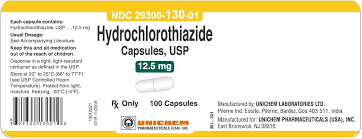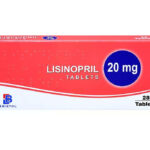What Are The Most Common Side Effects Of Hydrochlorothiazide?

Hydrochlorothiazide is a type of diuretic medication often used to treat high blood pressure and swelling due to fluid build up. Other uses include treating diabetes insipidus and renal tubular acidosis and to decrease the risk of kidney stones in those with a high calcium level in the urine. Hydrochlorothiazide blocks the reabsorption of sodium and chloride ions, and it thereby increases the quantity of sodium traversing the distal tubule and the volume of water excreted.
High blood pressure is a common condition and when not treated, can cause damage to the brain, heart, blood vessels, kidneys and other parts of the body. Damage to these organs may cause heart disease, a heart attack, heart failure, stroke, kidney failure, loss of vision, and other problems. In addition to taking medication, making lifestyle changes will also help to control your blood pressure. These changes include eating a diet that is low in fat and salt, maintaining a healthy weight, exercising at least 30 minutes most days, not smoking, and using alcohol in moderation.
How should hydrochlorothiazide be used?
Hydrochlorothiazide comes as a tablet, capsule, and solution (liquid) to take by mouth. It usually is taken once or twice a day. When used to treat edema, hydrochlorothiazide may be taken daily or only on certain days of the week. Follow the directions on your prescription label carefully, and ask your doctor or pharmacist to explain any part you do not understand. Take hydrochlorothiazide exactly as directed. Do not take more or less of it or take it more often than prescribed by your doctor.
Hydrochlorothiazide controls high blood pressure but does not cure it. Continue to take hydrochlorothiazide even if you feel well. Do not stop taking hydrochlorothiazide without talking to your doctor.
What are the most common side effects of hydrochlorothiazide?
The very common side effects of hydrochlorothiazide include:
- dizziness.
- headache.
- weakness.
- erectile dysfunction (trouble getting or keeping an erection)
- tingling in your hands, legs, and feet.
- blood pressure that’s lower than normal (especially when standing up after sitting or lying down)
The general list of side effects caused by hydrochlorothiazide is presented below;
• frequent urination
• diarrhea
• loss of appetite
• headache
• hair loss
If you experience any of the following symptoms, call your doctor immediately or get emergency medical treatment:
• blisters or peeling skin
• hives
• rash
• itching
• difficulty breathing or swallowing
• fever, sore throat, chills, and other signs of infection
• unusual bleeding or bruising
• ongoing pain that begins in the stomach area, but may spread to the back
• joint pain or swelling
• changes in vision, eye pain, or swelling or redness in or around the eye
• dry mouth; thirst; nausea; vomiting; weakness, tiredness; drowsiness; restlessness; confusion; muscle weakness, pain, or cramps; fast heartbeat and other signs of dehydration and electrolyte imbalance.
Hydrochlorothiazide Safety Information
You should not use hydrochlorothiazide if you are unable to urinate. Before using hydrochlorothiazide, tell your doctor if you have liver disease, kidney disease, glaucoma, asthma or allergies, gout, diabetes, or if you are allergic to sulfa drugs or penicillin.
Avoid drinking alcohol, which can increase some of the side effects of this medicine.
Avoid becoming overheated or dehydrated during exercise and in hot weather. Follow your doctor’s instructions about the type and amount of liquids you should drink. In some cases, drinking too much liquid can be as unsafe as not drinking enough.
There are many other drugs that can interact with hydrochlorothiazide. Tell your doctor about all medications you use. This includes prescription, over-the-counter, vitamin, and herbal products. Do not start a new medication without telling your doctor. Keep a list of all your medicines and show it to any healthcare provider who treats you.
If you are being treated for high blood pressure, keep using hydrochlorothiazide even if you feel fine. High blood pressure often has no symptoms.





